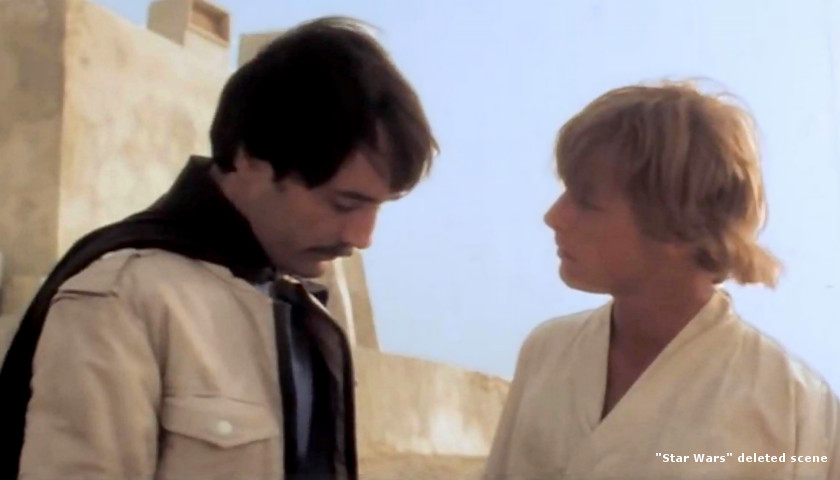by Grayson Quay
In the era of Disney, many long-time Star Wars fans have bemoaned the supposed infiltration of their favorite franchise by leftist ideology.
At first, I rolled my eyes at these objections, many of which remain patently absurd. But after Solo: A Star Wars Story gave us a shrill SJW droid hooking up with a pansexual Lando Calrissian, I had to admit that some critics might have a point.
This wasn’t always the case, though. In fact, one of the deleted scenes included in the 2011 Star Wars Blu-Ray collection explicitly connects the evil Galactic Empire with the socialist economic policies of Nazi Germany and the Soviet Union.
In Episode IV: A New Hope, George Lucas originally wrote and shot several scenes that would introduce the viewer to Luke Skywalker long before R2-D2 and C-3PO arrived at his family’s moisture farm. The first features Luke using a pair of macrobinoculars to watch Leia’s ship, the Tantive IV, exchange fire with Darth Vader’s Imperial-class Star Destroyer.
Excited by the prospect of adventure, Luke rushes to tell his friends at the Tosche Station, where he finds that his friend Biggs Darklighter has returned to Tatooine after graduating from the Imperial Academy. Luke’s friends quickly lose interest in his wild tales of space combat, and he and Biggs head off to grab a few malt brews and catch up. After a bit of banter, Biggs informs Luke of his plan to join the Rebellion.
Lucas cut these scenes to preserve the unbroken perspective of the droids (an homage to Akira Kurosawa’s The Hidden Fortress) and to avoid making what one colleague jokingly called “American Graffiti in space,” but they do deliver some excellent world building.
“The Rebellion is spreading and I want to be on the right side—the side I believe in,” Biggs says. “Yeah. Meanwhile I’m stuck here,” Luke responds, looking crestfallen as he explains that his responsibilities on his uncle’s moisture farm have forced him to cancel his application to the Academy yet again.
Biggs has no patience for these excuses. “What good’s all your uncle’s work if the Empire takes it over? You know they’ve already started to nationalize commerce in the central systems? It won’t be long before your uncle’s just a tenant slaving for the greater glory of the Empire.” (3:15 mark)
https://www.youtube.com/watch?v=a7NVb0OCD5g
That one line of dialogue transforms the Empire from a militaristic antagonist with an entirely unknown policy agenda to a totalitarian government with a state-run economy that bears a strong resemblance to both Hitler’s National Socialism and Stalin’s “socialism in one country.”
The scene in which Biggs urges Luke to fight to defend the free market may not have made it into the final film, but the implications it makes about Imperial economic policy live on. According to Wookiepedia, an online encyclopedia of the Star Wars expanded universe, Emperor Palpatine’s version of the anti-capitalist policies of his Nazi and Soviet counterparts was known as “imperialization,” a program that included “the state control and centralization of economic procedures… [and] commercial enterprises.” A major subplot in the recent novel Star Wars: Thrawn shows how imperialization ruined the mining planet Lothal, replacing innovation with cronyism and leading to forced labor, environmental destruction, and a massacre of peaceful protestors.
For power-hungry monsters like Hitler, Stalin, and Palpatine, dictatorship is impossible without socialism. George Lucas may be a frequent Democratic donor with an annoying penchant for offering left-wing interpretations of his own films, but Biggs’ remark to Luke clearly shows that, at least in the 70s, Lucas understood that free markets make free people.
– – –
Grayson Quay is a freelance writer. His work has been published in the Washington Times, the National Interest, Rare, and Townhall. He is a graduate of Grove City College, a former high school teacher, and a current M.A. student at Georgetown University. He enjoys writing poetry and listening to NPR. Follow him on Twitter @hemingquay.
Appeared at and reprinted from IntellectualTakeout.org.




